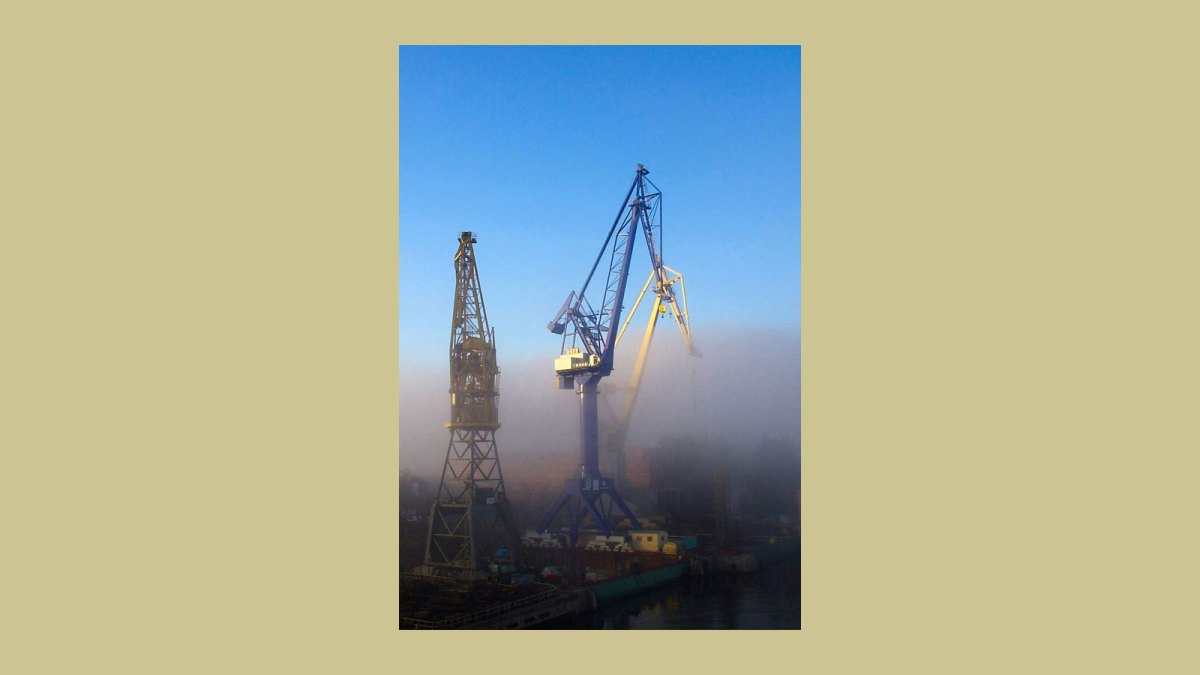Recently, Russian media reported on plans by the state-owned VTB Bank to build a new concert hall and performing arts complex for conductor Teodor Currentzis and his musicAeterna ensembles at the Novo-Admiralteysky shipyard in St. Petersburg.
On June 7, VTB President and Chairman Andrey Kostin and Governor Alexander Beglov signed a statement of intent formalizing the plan on the sidelines of the St. Petersburg International Economic Forum, according to the city’s official Telegram channel. The exact location for the complex has not yet been determined, though one potential site is an abandoned shipyard belonging to the United Shipbuilding Corporation. It will include two performance spaces—a large hall with between 1,500 and 1,800 seats, and a smaller hall with 700 to 900 seats—and cover an estimated 24,000 square meters, or about 260,000 square feet. Russia media has compared the plans to the Concert Hall “Zaryad’ye” in Moscow, but also to the Elbphilharmonie in Hamburg, because of their similar surroundings. According to Governor Beglov, the hall will represent “a new symbol for a city of the 21st century” and “a cultural monument of our time.” The budget circulating is 80 billion rubles (around $900 million).
The plans may finally provide an answer to a question that has occupied reporters, arts administrators, musicians, concertgoers, and even Currentzis’s fans and friends since the Russian invasion of Ukraine: Where does the conductor stand?
Even before the announcement, there were good reasons to criticize Currentzis for his activities in Russia. MusicAeterna, which he founded in Novosibirsk in 2004, has received funding from VTB Bank—the second-largest financial institution in the country, sanctioned after the invasion of Ukraine by the United States and the European Union—since 2019. Other sponsors include the energy firm Gazprom, and Rosatom, the State Atomic Energy Corporation, both of which are essential to the regime’s stability. Currentzis’s Diaghilev Festival in Perm is supported by a similar array of funders, which has necessarily meant proximity to Putin disciples. Kostin, Beglov, and Elvira Nabiullina, the Governor of the Central Bank of Russia, are all on the musicAeterna board of directors.
Currentzis has never made a clear statement on the war, and those who perceived his opposition in statements and programming decisions had to go looking for it. But there were also good reasons to defend Currentzis. He never tried to hide the fact that musicAeterna—which now includes, in addition to the orchestra, a choir, a dance company, and various chamber music ensembles—was his musical and emotional home. Currentzis taking a public stance against the war would mostly likely spell the end of his ensemble and financial worries for many of the musicians. “His choice is to either give everything up and appear ‘clean,’ or continue his work and give people work and income without speaking directly,” a choreographer who has worked with Currentzis told VAN. “That’s probably why he’s neither for nor against” the war.
Unlike with Valery Gergviev, there is no evidence that Currentzis shares Putin’s worldview; rather, their outlooks seems quite different. But when an artist is active in a totalitarian society, his role requires periodic reappraisal. Some of Currentzis’s supporters, such as Markus Hinterhäuser, the artistic director of the Salzburg Festival, have used the phrase “red line” to describe political decisions that may prevent Currentzis from being invited back. The line was never clearly drawn; might a brand-new concert hall in St. Petersburg do?
A $900 million concert hall might seem like a surprising investment in wartime Russia, but there is plenty of money available to finance the new performing arts complex. In February, VTB Bank announced record profits for the 2023 fiscal year. Like other major Russian financial institutions, VTB has profited from general economic growth, the shift to a war economy, and the increased flow of credit to weapon-industry suppliers. Russian firms that used to get loans abroad are now dependent on banks within the country. Kostin, the VTB President, visits Putin frequently. An avowed opera lover (“My favorite operas are patriotic works like Borodin’s ‘Prince Igor’ and Glinka’s ‘A Life for the Tsar.’ They show the spirit of our times”), Kostin has been tasked with building up the banking sector in the occupied territories of the Donbass and Novorossiya, as well as boosting the Russian ship-building sector.
After the Russian invasion of Ukraine, some commentators, noting Currentzis’s close connections to VTB Bank, wondered if his career in Europe was over. A handful of concert halls declared him persona non grata, or canceled concerts. The well-regarded SWR Symphonieorchester in Stuttgart, Germany, where Currentzis recently led his final concert as music director, said at the beginning of the war that “it is currently unclear to what extent VTB Bank’s funding for musicAeterna will continue.” Then, the statement seemed like a play for time: If VTB stopped funding musicAeterna, it would cease to exist, an outcome that Currentzis would probably never have accepted. Swapping VTB for another sponsor would hardly have silenced critics either: In Russia today cultural philanthropy can only happen with the government’s approval.
The latest from VAN, delivered straight to your inbox
But the new concert hall for Currentzis represents a new level of collaboration between musicAeterna and VTB Bank, and in turn between the ensemble and the regime: such ambitious projects are hardly possible without political involvement and an orientation toward government propaganda—especially not in Putin’s hometown of St. Petersburg. “The Russian President has determined strategic goals for Russian development until 2030 and in the future until 2036,” Governor Beglov said in his statement on the hall. “Part of those plans are the development of culture.”
It’s probably no coincidence that Currentzis’s longtime goal of building a concert hall for his ensemble—a reason he and musicAeterna left Perm in 2019 was because the city promised him a new opera house but didn’t deliver—is coming true now. Currentzis is one of the few prominent artists who continued to perform both in Russia and in the West after the invasion. Russian observers have followed the discussions about Currentzis in Europe closely. When he was uninvited from the Wiener Festwochen in February, newspapers and blogs described it as another case of “Russophobia” and an example of Western hypocrisy, with the West practicing the very censorship of which it accuses Russia. The construction project may be an attempt to secure Currentzis’s long-term loyalty. It may also be a “reward” for Currentzis’s decision not to turn his back on Russia. In 2022, when musicAeterna performed at the St. Petersburg International Economic Forum, the conductor asked VTB boss Kostin for a meeting, Kostin claimed. He expected Currentzis to say that he was leaving Russia for good, “especially since all the world’s stages are waiting for him. But he told me that he’s not a traitor and that he’s staying.” We don’t know if that’s what actually happened; either way, it demonstrates the narrative that is being spun around the conductor in Russia, which is that the nation takes care of its artists, while the “satanic civilization,” as propagandists have begun referring to Europe, cancels them.
As has often happened since the invasion, the SWR Symphonieorchester was among the last to hear the news about Currentzis’s new hall. In a statement to VAN, the orchestra said it had been “continually reviewing the relationship between Teodor Currentzis and his ensemble MusicAeterna to Russian business and government,” and that it would “certainly continue to do so if it is true that a new concert hall is to be built for Teodor Currentzis and musicAeterna in St. Petersburg.” Sources in the orchestra said they would like to continue working with him as a guest conductor. Musically, his tenure with the orchestra was a success: Before he started, the SWR Symphonieorchester was an awkward fusion of two previously separate groups; after, it was an orchestra. Still, orchestral management said that “at this time there are no concrete plans with him in the future.”
How long will promoters—who have largely stood behind Currentzis until now—tolerate this dance and the public pressure it puts on them? Furthermore, does Currentzis believe he can continue to be courted by the Russian state while performing in the West? Ideally, he’d tell us. But, as usual, he didn’t respond to a request for comment from VAN. (When he gives interviews these days, it’s only to outlets guaranteed not to ask awkward questions, like the Khaleej Times or Aeroflot’s in-flight-magazine.)
If Currentzis had to choose one or the other, he would probably choose Russia: because of his close relationship with his musicians, but also potentially because there, things are made possible for him in a way that doesn’t happen in the West. With musicAeterna, Currentzis created his own universe, one that revolves around him: No unions or HR departments, unlimited rehearsal time. (Even many Western musicians view Currentzis’s ensemble structures as the ideal way of making music.) “I don’t think he wants to keep his career both here and there,” a former employee told VAN. “I think he wants to keep what he built in Russia—because he built so much.”
The new concert hall at Novo-Admiralteysky would be within walking distance from the Mariinsky Theatre concert hall. But to compare Currentzis to Mariinsky boss Gergiev—the de facto cultural ambassador for Putin’s dictatorship—would be imprecise. Currentzis is no mafioso oligarch, no Putin apologist. Still, he has a need for power and influence, and a desire to be more than just a musician; and that makes it unlikely that he will be able to remain permanently independent of Russia’s totalitarian regime. In Russia these days, the pressure for artists to go along with war propaganda is intense, with musicians asked to perform in the occupied parts of Ukraine. Currentzis will face this pressure, a pressure he’s managed to avoid so far.
After the war began, Dom Radio, the radio hall that has been musicAeterna’s home in St. Petersburg, became a cultural meeting place for artists “who either would have gone hungry or left the country,” a choreographer who worked there told VAN. A former employee of Currentzis’s added that “Dom Radio was an oasis.” In the spring, the building closed for renovations. It remains closed until the end of 2026. In the meantime, it may well become part of the new complex, the propagandistic mirage disguising a cultural desert. ¶


